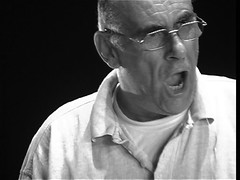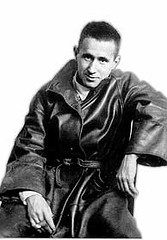Saturday, February 12, 2005
Roger Watkins, actor, director, writer, teacher, colleague and friend will take Bert's class on Monday 14th February - Valentine's Day - from 10 to 1.00. Hopefully, students will have mostly acquired scripts of The Mother by the beginning of next week. And now, in week two, we will begin to get to know the play....
Friday, February 11, 2005
Friday
They begin to walk round. I let them do this for ten/fifteen minutes. We then stop. We go into a circle and people in turn talk about what they saw, what they liked, what caught their attention. People notice: the arrangement of electricity sockets round the room; a spoon with a piece of used chewing gum resting in it; a cutting from a newspaper stuck on the front of the TV saying: Unhappy ending; a hole in the ceiling through which someone may be watching us; 'stars' shining through another series of small holes round a light fitting; the pattern made by the fold-up desks on chairs looked at from a certain angle, a single unswept-up 'pearl' from a broken necklace in the corner next to a dustpan and broom; some fluff; a mark on the wall; a pipe on the wall; a pin on the floor; a beautiful poem written on one of the fold-up desk tops; another fold-up desk with God is Dead written on. Etc
Many of these individual observations are greeted with both amusement and murmurs of recognition from the others in the group.
We then do another circle of the circle and I ask everyone how they think this exercise might relate to Brecht. Many comment on how the simplest things contain a lot of detail or history or information. How when they first came into the room - and most hadn't been in it before - they thought it was rather boring and uninteresting, but that when they were asked to do the exercise they found more in it than they'd at first thought.
Quite a lot of people thought the exercise was interesting because it corresponded with the idea that Brecht had about looking at things afresh. About really looking at something. About not taking it for granted. About how he wanted you to look at something you thought you knew but actually didn't. Maybe that this was connected with this idea of making something strange. Making the familiar, unfamiliar.
I asked both groups why Brecht might want to do this. Was it just for its own sake? Just to get people to be more questioning about 'life'. Both groups thought it was more specific than that. Felt that it was because he felt that there was another way of looking at society....
We didn't really go any deeper into that issue .... it's only our first week! we can't get everything at once! Anyway, it's Friday, it's almost 5.00pm. It's been a pretty long first week. Let's leave time for thoughts to simmer.
The second half I asked each student to recall an accident or event that they witnessed. There was a drowning, a number of street accidents, including a man pulled into the path of a car by his dog, a 'happy slap' incident, a fight outside a club in which a man had a row with a doorman and then got punched by someone else who wouldn't let him back in the queue. Before each witness spoke of the incident to the group s/he 'roadtested' it with another students, in formal and more formal ways.
What was interesting was the simplicity of the stories' telling. The simplicity of gesture. In Carlos' story, a blonde girl who was knocked off her bike had long hair. He didn't say she had long hair, he only said she was blonde - but he did a gesture of drawing his hands down the side of his head which indicated long hair and I believe he did it both times - the first time when he told the story in Spanish and the second time when he told it in English.
I'm really glad I asked him to tell the story in Spanish too. Because Nuria in also a Spanish speaker and she was the only one to understand it the first time. From time to time she expressed surprise or horror as he heard the details. The only thing the rest of us could understand was 'Waterloo Bridge'. Then I asked Nuria to tell the story - again in Spanish. To my eye it was pretty similar. It seemed true to the original. Then I asked Carlos to do his same story - but this time in English - and now we understood it. Then I asked Abigail to tell the same story again - in English - but as Carlos had told it, including using his Spanish accent. To my mind she did it pretty accurately.
A number of people told other peoples' stories in the way that they had told them. Tanya told Tom's skateboard story like Tom. Hanna told Kayleigh's story about laughing at a woman who slipped in the street.
What I liked about all the work was it's economy. Amir's story about the man being pulled into the road by his dog was illustrated by a very memorable - and economical - gesture of the lead being wrapped round the man's wrist. It was so strong that in each subsequent version of this the 'imitator' adopted the gesture. Similarly Claudia's drowning story had one real gesture which was the way she saw the woman being lifted out of the water by her arms. It looked both playful and functional, the way two people might throw a flour sack off the back of a lorry.
We drew no hard and fast conclusions. The only point I made at the end was that though the stories were told economically they were not told, or retold in a lifeless or deadly fashion. That economy ≠ deadly or lifeless.
I announced that Roger Watkins would be Monday's teacher.
Die Mutter
Enjoy!
Warcrime
Warcrime
Thursday, February 10, 2005
Learning Thursday
Everyone present. Everyone on time.
Lots of paperwork to start. Reading assignment texts. Reading assignment instructions. Links to websites - including the blog. Chance to go to the Amazon Germany site and listen to a few samples from Die Mutter. Tony has a couple of these CD's ordered at the moment.
Today, all about LEARNING AND TEACHING. We started with Hide and Protect. (and Grandmother's Footsteps). We then did quite a lot of work on Contact Improvisation in pairs.A and B. One offers. One accepts. The main points here are that:
Talked about discipline balanced with playfulness. Alertness of the people waiting to creep up on Grandmother. Stillness of people ready to sneak up. But the moment she turns her back - they are full of tricks. Full of mischief. Full of life. Full of movement. Stillness doesn't = lifelessness.
Yin and Yang connected to Dialectics?
Lots of paperwork to start. Reading assignment texts. Reading assignment instructions. Links to websites - including the blog. Chance to go to the Amazon Germany site and listen to a few samples from Die Mutter. Tony has a couple of these CD's ordered at the moment.
Today, all about LEARNING AND TEACHING. We started with Hide and Protect. (and Grandmother's Footsteps). We then did quite a lot of work on Contact Improvisation in pairs.A and B. One offers. One accepts. The main points here are that:
- The energy of accepting should be no more and no less than the energy of offering.
- That while the one who offers must have confidence, the one who accepts should have trust.
- That both the offering and accepting should be unconditional
Then, in pairs, we taught one thing to our partner and learned one thing from her. Maybe a dance step, a rhythm, a nursery rhyme, a trick. In pairs we had to present it to the rest of the class.
We then looked at the whole question of learning styles; visual, auditory, kinesthetic.... Of how both learning and teaching are entwined. Of the teacher's responsibility to the student... and vice versa. And the trust, vice versa. About the presentation of what has been learned. Of performing it with confidence. As well as with care.
Of the ying and yang of Brecht. The dynamic of opposites. Of discipline and playfulness
Talked about discipline balanced with playfulness. Alertness of the people waiting to creep up on Grandmother. Stillness of people ready to sneak up. But the moment she turns her back - they are full of tricks. Full of mischief. Full of life. Full of movement. Stillness doesn't = lifelessness.
Yin and Yang connected to Dialectics?
Tuesday, February 08, 2005
Steve T
An English teacher, student and lover of the lessons of a German Marxist playwright, director and poet.
Monday, February 07, 2005
Happy Monday
Dear Students
So. We've met. (Most of us; most of us on time. It will be ALL of us on Thursday). No more dead Grannies. We pray.
Here are my, observations of what happened:
Group A. A lot of time taken up with talking about lateness. About not being there. But then we started. With a warm-up. We walked round the room in a number of ways. We changed direction at 90 degree angles. We tip-toed. We crawled. We made curved lines. We slithered. We tried to observe what other people were doing as we walked. To be observant. A little later we formed a circle, joined hands and sent a squeeze round the circle to make sure we were in contact as a group. The group very important. Focus very important.
We split into pairs and we had 3 minutes each to find out as much about the other person as we could. At the end of it we all got in a line against the wall and indiviuallly came out to speak. But as the person we'd been speaking to. Some boys were girls. Some girls grew babies. Some mothers were childless for a few minutes.
We made a circle and we went round in turn, each person saying one thing about BB. If you didn't want to say anything you said: Pass. Steve said YES or THANK YOU after each comment, but it wasn't meant that any one comment was 'correct' or 'better' than the next. Steve kept his own clear opinions to himself.
We then had to form into groups of about 4 people and perform a scene from 'an undiscovere Bertolt Brecht play' from the year 1930. The idea was to incorporate each group's IDEA of what such a play might contain. There was about 5 minutes allowed for the brainstorming and rehearsal of this. They were then performed in front of the rest of the group.
Steve asked us to then say what happened or what we SAW. To describe the events. Like a witness or a reporter. What went on. We then sat in a circle again and Steve asked us what was going on in 1930 in the world. We talked briefly of some of the events. Of what it might have been to have lived at that time. Talked of the First World War. Talked of The Great Depression. Wall Street Crash. This led to Steve asking if anyone in the group was a mother. And one person was. Sandra. Steve knew that already but didn't let on. Sandra was a student of his last year who had to drop out for a while.
Steve was pleased that Sandra was in the group. We had real experience to measure our discussions by.
We talked of the qualities needed to be a mother. Some spoke of being less selfish. Of thinking less of yourself. Taking care of another. Steve then said that we would be studying a Brecht play called The Mother. What would happen if it was the Depression and you didn't have any food for your baby? What would you be prepared to do? Beg? Steal? Prostitute yourself?
Sandra spoke strongly about her knowledge of women who'd been in such extreme states. Of women in Jamaica who would go out to earn a little rice or chicken for her babies. Our time came to an end. The two tasks for Thurs: to write our (B)log for the class and to research a bit more on the period leading up to 1930 in Europe, the climate in which BB was writing.
Group B
Very much the same as Group A but with these differences:
When I mentioned the question of Dead Grannies and how the Grannies stopped dying once the students at Mountview were threatened with losing good parts in next term's show, Nuria said that she had two children. What would happen if one of them was taken ill and had to go to hospital? That her father died two months ago in Spain.... Did the Dead Grannies Rule still apply? Steve said that he thought she already knew the answer.
We didn't do a physical warm up. It was now mid-morning.
Nuria was, of course, our real mother. We also had, in this section of the class, more time at the end to probe the idea of what would you do if your baby needed feeding and you had nothing to give it? We concretely asked the NI student (Hannah?). Ok. So. You've tried everything. But you can't find any money to feed the baby. And she's been crying all day. Now this lorry driver comes along (the student sitting next to me in the circle). He says he'll give you five rand if you sleep with him. What would you do? Hanna ? said she wouldn't do it? Steve asked her what would she do instead? There are loads of women in this town. None of them have any real work or money. Many of them would be happy to sleep with the lorry driver.
Even though it might mean another baby or - particularly in this country - a big risk of Aids. Hannah? then asked 'the lorry driver' if he would wear a condom and he refused. One student said she'd just kill her baby. A number of students insisted you'd do anything to protect the child, no matter what the 'morality' of the situation: stealing, deception, prostitution. Bread before morals. Nuria - the real mother in this group - kept saying you'd do anything, with similar intensity to that of Sandra in the first group. Our time came to an end and the tasks they had for Thursday were the same.
So. We've met. (Most of us; most of us on time. It will be ALL of us on Thursday). No more dead Grannies. We pray.
Here are my, observations of what happened:
Group A. A lot of time taken up with talking about lateness. About not being there. But then we started. With a warm-up. We walked round the room in a number of ways. We changed direction at 90 degree angles. We tip-toed. We crawled. We made curved lines. We slithered. We tried to observe what other people were doing as we walked. To be observant. A little later we formed a circle, joined hands and sent a squeeze round the circle to make sure we were in contact as a group. The group very important. Focus very important.
We split into pairs and we had 3 minutes each to find out as much about the other person as we could. At the end of it we all got in a line against the wall and indiviuallly came out to speak. But as the person we'd been speaking to. Some boys were girls. Some girls grew babies. Some mothers were childless for a few minutes.
We made a circle and we went round in turn, each person saying one thing about BB. If you didn't want to say anything you said: Pass. Steve said YES or THANK YOU after each comment, but it wasn't meant that any one comment was 'correct' or 'better' than the next. Steve kept his own clear opinions to himself.
We then had to form into groups of about 4 people and perform a scene from 'an undiscovere Bertolt Brecht play' from the year 1930. The idea was to incorporate each group's IDEA of what such a play might contain. There was about 5 minutes allowed for the brainstorming and rehearsal of this. They were then performed in front of the rest of the group.
Steve asked us to then say what happened or what we SAW. To describe the events. Like a witness or a reporter. What went on. We then sat in a circle again and Steve asked us what was going on in 1930 in the world. We talked briefly of some of the events. Of what it might have been to have lived at that time. Talked of the First World War. Talked of The Great Depression. Wall Street Crash. This led to Steve asking if anyone in the group was a mother. And one person was. Sandra. Steve knew that already but didn't let on. Sandra was a student of his last year who had to drop out for a while.
Steve was pleased that Sandra was in the group. We had real experience to measure our discussions by.
We talked of the qualities needed to be a mother. Some spoke of being less selfish. Of thinking less of yourself. Taking care of another. Steve then said that we would be studying a Brecht play called The Mother. What would happen if it was the Depression and you didn't have any food for your baby? What would you be prepared to do? Beg? Steal? Prostitute yourself?
Sandra spoke strongly about her knowledge of women who'd been in such extreme states. Of women in Jamaica who would go out to earn a little rice or chicken for her babies. Our time came to an end. The two tasks for Thurs: to write our (B)log for the class and to research a bit more on the period leading up to 1930 in Europe, the climate in which BB was writing.
Group B
Very much the same as Group A but with these differences:
When I mentioned the question of Dead Grannies and how the Grannies stopped dying once the students at Mountview were threatened with losing good parts in next term's show, Nuria said that she had two children. What would happen if one of them was taken ill and had to go to hospital? That her father died two months ago in Spain.... Did the Dead Grannies Rule still apply? Steve said that he thought she already knew the answer.
We didn't do a physical warm up. It was now mid-morning.
Nuria was, of course, our real mother. We also had, in this section of the class, more time at the end to probe the idea of what would you do if your baby needed feeding and you had nothing to give it? We concretely asked the NI student (Hannah?). Ok. So. You've tried everything. But you can't find any money to feed the baby. And she's been crying all day. Now this lorry driver comes along (the student sitting next to me in the circle). He says he'll give you five rand if you sleep with him. What would you do? Hanna ? said she wouldn't do it? Steve asked her what would she do instead? There are loads of women in this town. None of them have any real work or money. Many of them would be happy to sleep with the lorry driver.
Even though it might mean another baby or - particularly in this country - a big risk of Aids. Hannah? then asked 'the lorry driver' if he would wear a condom and he refused. One student said she'd just kill her baby. A number of students insisted you'd do anything to protect the child, no matter what the 'morality' of the situation: stealing, deception, prostitution. Bread before morals. Nuria - the real mother in this group - kept saying you'd do anything, with similar intensity to that of Sandra in the first group. Our time came to an end and the tasks they had for Thursday were the same.






